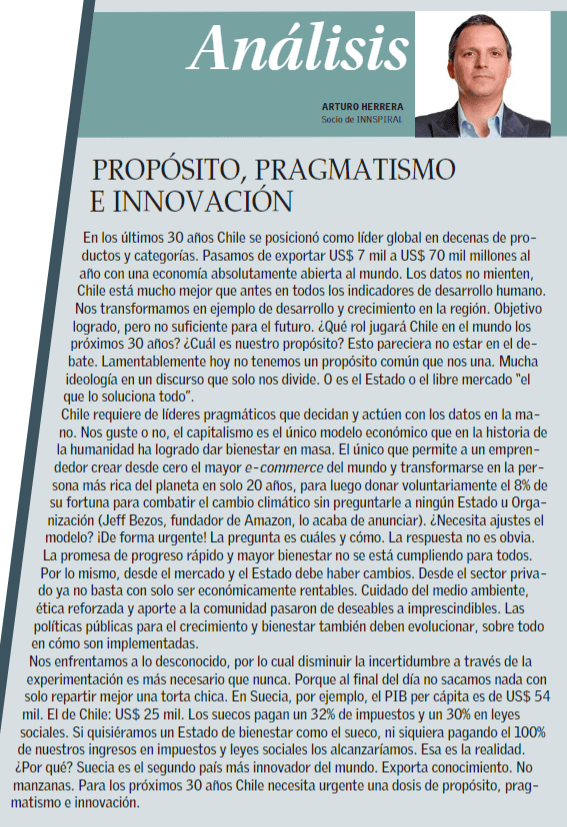Over the past 30 years, Chile has established itself as a global leader in numerous products and categories. We’ve gone from exporting $7 billion to $70 billion annually with an economy that’s fully open to the world. The data doesn’t lie—Chile is faring much better across all human development indicators than before. We’ve become an example of development and growth in the region. Objective achieved, but not sufficient for the future. What role will Chile play in the world over the next 30 years? What is our purpose? These questions seem to be missing from the debate. Unfortunately, today we lack a common purpose to unite us. There’s too much ideology in a discourse that only divides us. It’s either the state or the free market that “solves everything”.
We’re facing the unknown, which makes reducing uncertainty through experimentation more necessary than ever.
Chile needs pragmatic leaders who make decisions and act based on data. Whether we like it or not, capitalism is the only economic model in human history that has succeeded in providing mass welfare. It’s the only model that allows an entrepreneur to create the world’s largest e-commerce platform from scratch and become the richest person on the planet in just 20 years, only to voluntarily donate 8% of his fortune to combat climate change without asking any state or organization (Jeff Bezos, founder of Amazon, just announced it). Does the model need adjustments? Urgently! The question is what and how. The answer is not obvious. The promise of rapid progress and greater welfare is not being fulfilled for everyone. Therefore, changes must come from both the market and the state. In the private sector, it’s no longer enough to be economically profitable alone. Environmental care, strengthened ethics, and contributions to the community have shifted from desirable to essential. Public policies for growth and well-being must also evolve, especially in how they are implemented.
We’re facing the unknown, which makes reducing uncertainty through experimentation more necessary than ever. Because at the end of the day, we gain nothing by simply redistributing a small pie more evenly. In Sweden, for example, the GDP per capita is $54,000. In Chile, it’s $25,000. Swedes pay 32% in taxes and 30% in social security contributions. If we wanted a welfare state like Sweden’s, we wouldn’t even reach it by paying 100% of our income in taxes and social security contributions. That’s the reality. Why? Sweden is the second most innovative country in the world. It exports knowledge. Not apples. For the next 30 years, Chile urgently needs a dose of purpose, pragmatism, and innovation.
Opinion column originally published in Diario El Mercurio.



